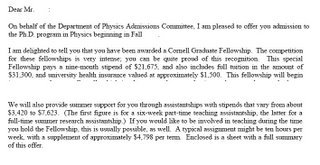I was chatting with my boss the other day during lunch. His route to academia is rather unusual.
As an undergraduate, he went to a lesser-known public university because it was near home and his working-class family was poor. The 70s was a difficult time for many working-class families especially when factories were closing down in the US and blue-collar jobs were outsourced, ironically, to places like Singapore. The first time he had steak was after he had left home to attend college. In college, he survived on two dollars a day - 40 cents for a can of peas, 75 cents for a can of tuna and the rest on rice and pasta - so that he didn't have to work during the regular semester and could concentrate fully on studying. He worked fulltime in summer to pay for his expenses. He did say something about joining a fraternity though. People with his family background and gifts usually don't think about taking up a major in a dangerously unremunerative field, much less go to grad school. At least, a Singaporean of that background wouldn't go down that road.
After he got his basic degree, he stayed on in the same university to finish his PhD for family reasons and got his PhD in 3.5 years, followed by a very productive postdoctoral stint in Britain before he moved to a respectable national lab on the west coast where he stayed for 10 years. Most people in his shoes wouldn't think about going into academia, much less one in a competitive top-tier research university, especially when they are free to stay in a research environment where funding is not a problem and life is less hectic. Oh, the weather is a hell lot nicer on the west coast.
After 10 years in the national lab, he moved to a top-tier research public university in rural central Illinois (i.e. middle of nowhere) to be an assistant professor, essentially working his way up the ranks. Today, he's an APS fellow, a full professor with appointments in three departments, two of which are ranked in the top 3 in their fields and a top honcho in his research specialty. And he still finds time to coach his son's little league team.
Frankly, I find that amazing and inspirational. I believe that, very often, people, especially I, are only held back by their insecurities and their lack of achievements are only a consequence of the unwillingness to look past the hand that fate has dealt them and move on to achieve greater things. Everyone has dreams. It's a matter of whether we dare to believe in them or not.
I must work harder. Bloody harder.
As an undergraduate, he went to a lesser-known public university because it was near home and his working-class family was poor. The 70s was a difficult time for many working-class families especially when factories were closing down in the US and blue-collar jobs were outsourced, ironically, to places like Singapore. The first time he had steak was after he had left home to attend college. In college, he survived on two dollars a day - 40 cents for a can of peas, 75 cents for a can of tuna and the rest on rice and pasta - so that he didn't have to work during the regular semester and could concentrate fully on studying. He worked fulltime in summer to pay for his expenses. He did say something about joining a fraternity though. People with his family background and gifts usually don't think about taking up a major in a dangerously unremunerative field, much less go to grad school. At least, a Singaporean of that background wouldn't go down that road.
After he got his basic degree, he stayed on in the same university to finish his PhD for family reasons and got his PhD in 3.5 years, followed by a very productive postdoctoral stint in Britain before he moved to a respectable national lab on the west coast where he stayed for 10 years. Most people in his shoes wouldn't think about going into academia, much less one in a competitive top-tier research university, especially when they are free to stay in a research environment where funding is not a problem and life is less hectic. Oh, the weather is a hell lot nicer on the west coast.
After 10 years in the national lab, he moved to a top-tier research public university in rural central Illinois (i.e. middle of nowhere) to be an assistant professor, essentially working his way up the ranks. Today, he's an APS fellow, a full professor with appointments in three departments, two of which are ranked in the top 3 in their fields and a top honcho in his research specialty. And he still finds time to coach his son's little league team.
Frankly, I find that amazing and inspirational. I believe that, very often, people, especially I, are only held back by their insecurities and their lack of achievements are only a consequence of the unwillingness to look past the hand that fate has dealt them and move on to achieve greater things. Everyone has dreams. It's a matter of whether we dare to believe in them or not.
I must work harder. Bloody harder.



